Gluten Reduced Beer – Bane or Blessing?
As an Amazon Associate and member of other affiliate programs, I earn from qualifying purchases.
Gluten reduced beer. It’s a hot topic, because not every one sees eye to eye on this frosty beverage. So, amidst all the talk, what is gluten reduced beer and what does science say about its safety?
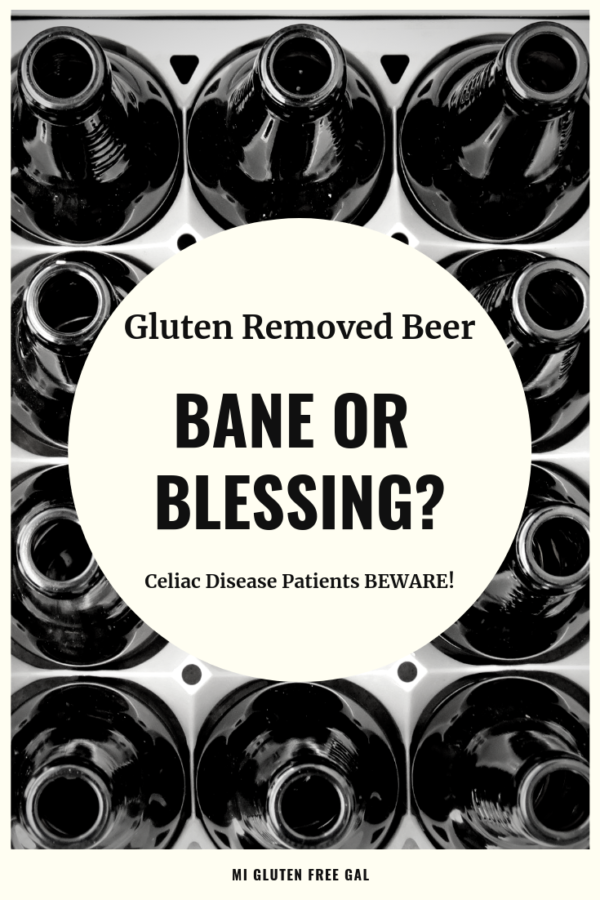
Gluten Reduced Beer, Brewer’s Clarex, and Hydrolysis
Brewers create gluten reduced beers with barley, a grain that naturally contains gluten. The creators of Omission (and many other gluten reduced beers on the market) add a chemical that claims to “break down” gluten through hydrolysis. This chemical, Brewer’s Clarex, hydrolyzes gluten proteins to make beers appear less cloudy. But testing its safety is less transparent.
So far, the only testing methods widely available to manufacturers is ELISA testing. For non-hydrolyzed or fermented foods, ELISA is good. However, it only detects complete gluten protein chains, not fragments. Therefore, hydrolyzed foods and liquids, which create gluten fragments, can’t be accurately tested with these methods.
For a better scientific explanation about hydrolysis and gluten free testing, please see this post “Sandwich ELISAs and Hydrolyzed Gluten,” written by the Gluten Free Dietitian.
Another good article regarding Brewer’s Clarex – “Is Barley Based Beer Gluten Removed Beer Safe for People with Celiac Disease?”
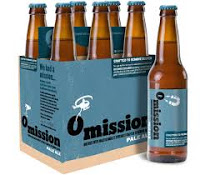
Gluten Intolerance Group Performs Study on Gluten Reduced Beer
In 2017, the Gluten Intolerance Group conducted a study, in coordination with the University of Chicago Celiac Disease Center. They sought to understand the conflicting anecdotal reports from those who drink gluten reduced beer. Some claimed after imbibing, that they had no reactions. Some stated that they did. Therefore, GIG and Univ. of Chicago performed a lab based study.
This study utilized serum from patients diagnosed with Celiac Disease. They tested serum against traditional beer, naturally gluten-free beer and gluten reduced beer. They did this by reducing the beers down, extracting their residual proteins, and then pairing those proteins with patient blood serum. Chemical reagents then showed whether Celiac antibodies bound to those proteins.
Interestingly, their research reflected the comments from those drinking gluten reduced beer. Serum from some patients reacted, some did not. However, based on their research, GIG concluded they will NOT certify these beers as gluten free. Because one cannot predict who will react, and who will not, one must take precautions that will protect everyone.
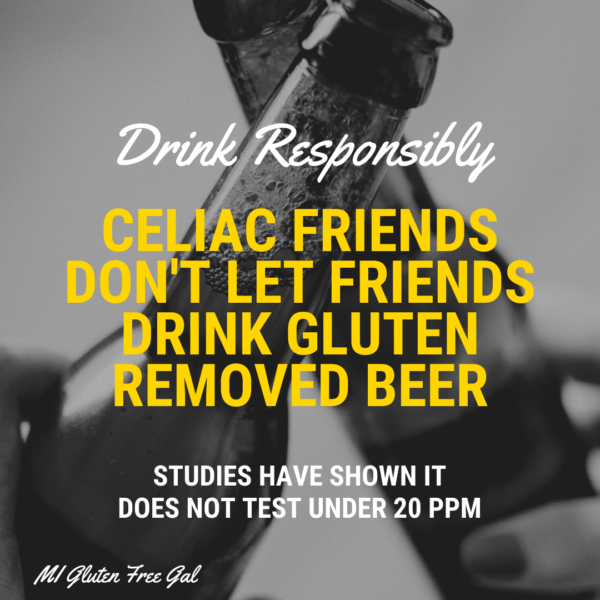
The FDA Clarifies Concerns About Hydrolysis and Gluten
In 2013, the FDA created a definition of the term “gluten free.” This included statements that foods (and beverages) labeled gluten free must contain under 20 ppm of gluten. Since then, advocates have requested (multiple times) for the FDA to speak further on hydrolysis and fermentation in foods labeled gluten free. Which impacts the gluten reduced beer market.
In August of 2020, the FDA finally spoke. They declared that any hydrolzyed or fermented foods, that desire a gluten free claim, must use ingredients that are gluten free prior to these chemical reactions. Please read Gluten Free Watchdog’s post “FDA Publishes Final on Gluten Free Labeled Fermented or Hydrolyzed Foods.”
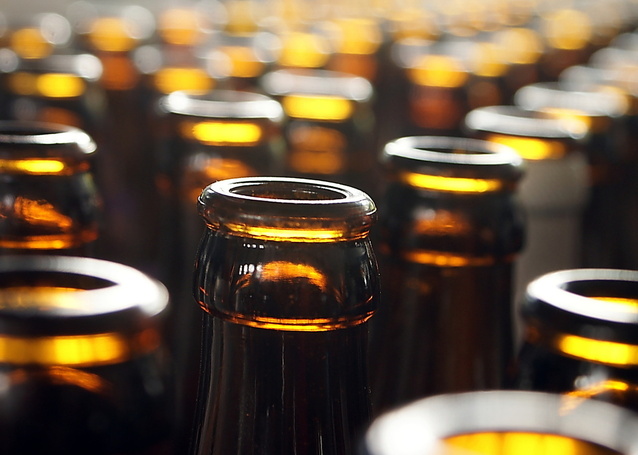
The FDA vs the TTB
Technically, most alcohol falls under the jurisdiction of the Tobacco Tax and Trade Bureau, known as the TTB. In fact “The labeling of all beers made with both malted barley and hops is under the jurisdiction of the TTB. If a beer is made without either malted barley or hops its labeling is under the jurisdiction of the Food and Drug Administration (FDA).” (source, Gluten Free Watchdog; Is Barley-Based “Gluten-Removed” Beer Safe for People with CeliacDisease?)
So what does the TTB say on the matter? They state a gluten reduced beer must include this on their label or in advertising: “Product fermented from grains containing gluten and processed to remove gluten. The gluten content of this product cannot be verified, and this product may contain gluten.” (See this link, page 10.) Therefore, it’s important to do your research.
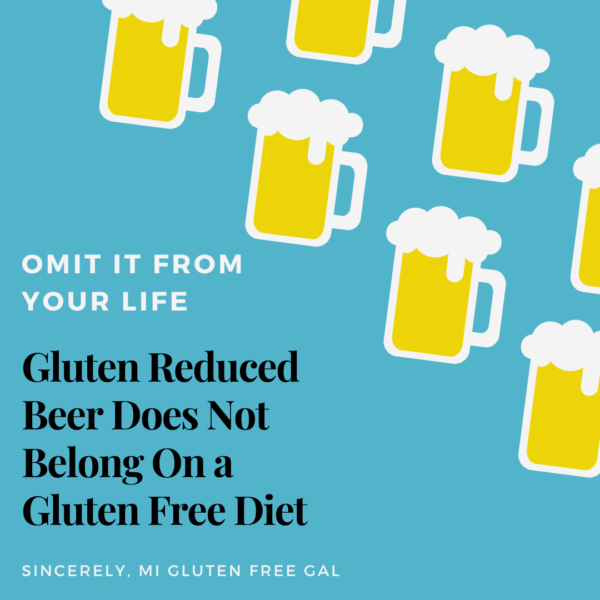
Further Thoughts on Gluten Reduced Beer & Testing
All of these regulations depend on the gluten analysis testing we currently have available. Another form of testing, called Mass Spectrometry, looks at gluten differently than ELISA testing does. While this type of testing is in early stages, a Forbes article published in 2017 showed that gluten reduced beers contained well over 20 ppm of gluten.
Unfortunately, the understanding of malt and gluten reduced beers is not universal. In the UK, gluten reduced beers are actually allowed to be labeled gluten free. GF Tracy further explains the UK guidelines in her post about “Can you Detect Gluten in Beer?” Which means we need to be on guard when purchasing beers from outside the United States.
Therefore, I encourage you to only drink beer made from gluten free grains. I’ve compiled a list of them in my updated Gluten Free Beer Review post. In addition, wine, hard cider and mead all contain no gluten, and are acceptable choices. GF Jules provides some excellent suggestions in her post about Gluten Free Alcohol. Please remember to always drink responsibly.
How do you feel about gluten reduced beer? What is your favorite gluten free beer?

I really appreciate your work and your page. I think the acronym you are missing in this post is TTG. As a ten-year celiac who is very strict about my diet with a husband and physician to back me up, I drink O’mission and the like without issues and my TTG levels remain low. Your article does a good job of explaining why that might be.
Because of that individual variation in how one might react, I think it would be helpful to counsel people to keep an eye on their TTGs if they want to test their own tolerance to those gluten-reduced beers, rather than just trust their gut.
Now – you won’t get me anywhere near a Corona or Bud Light. That purely anecdotal stuff doesn’t work for me!
Thanks for what you do!
Dear Paula,
Thanks for your feedback. While I understand your point, unfortunately research has recently shown that low TTG numbers, after diagnosis, may not always correlate to intestinal recovery. Please see this link. https://www.ncbi.nlm.nih.gov/pmc/articles/PMC5457911/
Also, this has actually happened to me. I had excellent TTG numbers, but a new gastro wanted to do a scope due to me being a new patient. Still found intestinal damage, which shocked both him and myself. And this is despite the fact I maintain a gluten free household and am very careful in what I eat. The more we learn, TTG numbers may not in fact be the best way to monitor Celiac gut health.
Because while it may be true that Omission doesn’t impact everyone negatively, as a celiac disease advocate, I have to be an advocate for the ones that it will impact negatively. We also